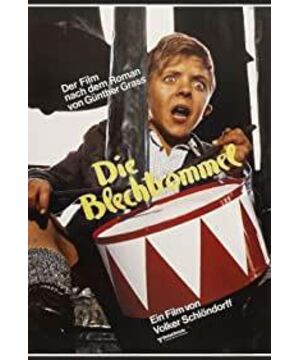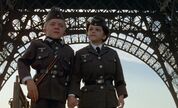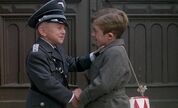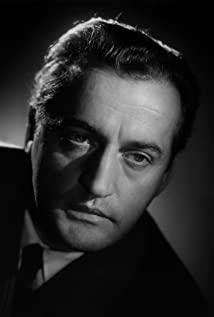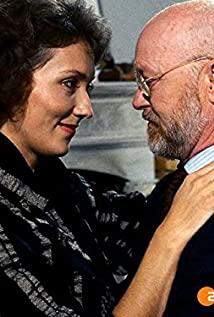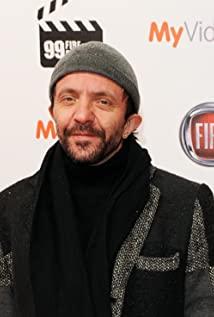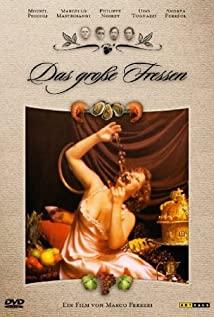The Tin Drum, borrowed from a friend, has been sitting for nearly half a month. Every time I sit in front of the computer and want to see it, I always get a little gloomy. I thought, maybe I couldn't understand the director's reason for making the film, so I flipped it in my hand many times, and finally put another disc into the computer. I don't dare to look at the stuff that confuses me, and not being able to understand is a waste of time. So, until I had a conflict with the "adult" one weekend, and I didn't intend to read the film review of this film, I thought, maybe it's time to accept it.
Poured a glass of warm water, tore the bag of melon seeds, turned on the computer in the late afternoon, and left the beautiful April night to the movie "The Tin Drum".
The camera slowly opens from the beautiful potato field in Kasubia in 1899. The story begins with a young woman wearing four skirts...
On Oscar's third birthday, he looked at the world of the adults around him, endless desire, hypocrisy In his little heart, he couldn't understand the world, so he planned a "scheme": he took the gift he got on this birthday - a red and white tin drum and deliberately fell down the cellar stairs. So the plan succeeded, he will stop the development of his body, no longer grow taller, and will always remain only three years old. He is very proud of himself that he can escape the ugly society of adults. However, although the body does not change, the mind does not stop growing. Under the appearance of being just a child, he also experienced the death of his relatives and the failure of love. He's been tricked, and he's been baptized by war. He even planned to kill the man (adult) who killed his first love himself. This three-year-old "child" has his own son.
This is just a child, when he is powerless to change the adult world he doesn't like, he can only avoid growing up. He can't change the life he doesn't like, and he can only do his best to shout when something doesn't go his way, making weird noises enough to shatter glass. He just did it to protect himself from harm.
I don't know if kids these days have the same fear of growing up and becoming an adult like Oscar. I don't know what children think today when they see adults doing things that their young minds can't understand. Maybe we just envy how simple and beautiful our children's world is, but we don't know them. Maybe three-year-old children already have the space and ability to think for themselves, maybe they are not as simple as we imagined. But who really visited their hearts?
Oscar lives in a large family, and his mother, Annie, is a beautiful young woman. She longs for love and has been living with two men. Oscar's father, opened a shop to support the family. He is a middle-aged man with a calm and tolerant appearance, who constantly tolerates his wife's cheating with other men. My uncle is Polish and has a firm national complex. He is a middle-aged man who works in the Polish post office and is proud of it. This life went on for nearly twenty years. Women never stop in love, they want a lot. So Annie has a relationship with Oscar's uncle, her cousin. After she blamed herself for the mistake, she couldn't change it. So Annie punished herself in extreme ways. Eventually she went to see God. When Oscar was 15 years old, the first woman he loved in his life, his mother, left him.
On that day, Oscar for the first time lost his cherished tin drum, the only tin drum in his life that brought him comfort.
The film has such a speech: There was once a drummer, his name was Oscar, and his mother saw God because she ate too much fish. There used to be a group of devout Santas, but Santa didn't spare them, he was the arsonist. There was once a toy dealer, his name was Marcus, who sold tin drums painted red and white. When he went, he took all the toys in the world! This red and white tin drum is Oscar's only tool to escape the real world. Toys are a symbol of a child's childhood. The death of the toy dealer is a metaphor for Oscar's complete loss of dreams. He had to face adult life.
Soon, Oscar began to experience war. Germany occupied Danger, and the pure world of Oscar's dream became ashes with the attack of artillery fire. In the Polish counterattack camp, Oscar witnessed the brutality of the war and the departure of relatives and friends around him. At this time, he may no longer be as sad as losing his mother, and in his mind, death is no longer so terrible and unacceptable. So, soon he lost his family again - what he thought was his poor uncle. All this allowed Oscar's mind to grow rapidly. He slowly accepted reality and stopped running away.
Of course, this child also has love. Oscar experienced love for the first time when he was 16 years old. He loves Maria, a woman of the same age as him but with a vastly different appearance (she looks a lot like Oscar's mother when she was young). He would go kiss him and have sex with her. Maria may never understand the very adult love shown by Oscar, who is just a child. So, Oscar can only fail. And when he saw his lover being insulted by another man (father), he couldn't protect her. He could only comfort her in his own way. Of course, adults don't care what children do. Oscar fails for the first time in love. He left home when he was 17 years old.
Oscar's heart is growing, his dream will not grow up and only limited to his body, but his heart cannot escape changes. He was distressed, and even more disgusted with this adult society. When he met those dwarf friends again, he found that only with people in the same world would he be happy and understood. He lived happily with the dwarfs, went to the barracks, and earned the respect of adults with his tin drums and weird screams. With the same friends in the same environment, he got a successful career (the show was popular), and love came again. The cruelty of war is unimaginable. When he was happy for his own strategy again, the war made him lose his beloved for the third time, the woman who was also a dwarf.
After repeated blows, Oscar finally understands that nothing can be solved just by escaping. It is impossible for him not to grow up and learn to face it. In desperation, Oscar had to go home. to face his reality.
War soon came again. During a seizure, Oscar had his father swallow the party emblem. He cost the man his life in the end. He finally won, after the failure of love, he planned to kill the man who lived with Maria. At this time, he defeated the adults for the first time and fought for his rights back. It was also at this time that he finally realized that only when he truly became an adult could he do what he liked. Children are never valued and can only be hurt.
So Oscar shouted at his father's funeral - I'm going to grow up! Oscar's wish was fulfilled again, and he began to grow.
The film has many close-ups of Oscar's eyes, from different things encountered at different ages. When he was three years old, he saw the world, and his eyes were full of confusion. When he was six years old, when he saw the lust of his mother and uncle, his eyes were desolate and sad. Seventeen-year-old's wide-open eyes were full of desire. Of course, there was also the trace of melancholy in his eyes when he shouted "I want to grow up!", which instantly turned firm.
Looking at these fearful and sad eyes, my heart is aching. When adults have been gradually decadent by material money, children's hearts are pure. When every baby is born, their eyes are wide and full of expectations for the unknown. They have a happy childhood and clean thoughts. They are constantly groping for growth. We repeat to these immature lives: you are the masters of the future, you are about to bear great responsibilities, and you have unconsciously changed their original pure thoughts. I don't know how these children who grew up in cities covered with steel and cement will tell their descendants about this society and the experience of growing up. But looking at these children, it hurts to think of their future. We changed their futures, filling their young hearts with too much weight. One day, when they do too much for us to understand, we may be the ones to blame.
"The Tin Drum", also known as "The Tin Drum", is adapted from the original work of the famous German novelist Ghent Grasse. Director Schullen Dove transformed the image depicted in the original text into rich images, accompanied by pictures and music. In the broken footage, love and desire are intertwined throughout the film, and the smoke of war can be seen everywhere. The film talks about a lot. Two World Wars, Hitler, Nazi Party, Jews, racism. A lot of things are intertwined in the film, which makes people continue to reminisce.
The war caused the Oscar family to leave their home, leaving only the elderly grandmother. The old woman was still plowing the potato field, the wind blowing her four skirts.
View more about The Tin Drum reviews


